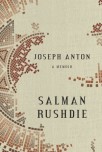
 Joseph Anton
Joseph Anton
By Salman Rushdie
Random House, hardcover, 636 pages, $30.00
In the terrifying opening chapters of Joseph Anton Salman Rushdie recounts Valentine's Day 1989 when he woke to the news that the Ayatollah Khomeini had decreed a fatwa on his head because of his book The Satanic Verses.
To save himself, Rushdie had to establish an alias so he could function as a working author and rent 'safe' houses to avoid being murdered, so Joseph Anton was born, in tribute to Conrad and Chekhov. And you'd be hard pressed to invent a set of circumstances that would take someone to the heart of darkness with more relevant dramatic realism than this memoir.
Rushdie, already an internationally successful award-winning novelist, had offended Islamic religious leaders of the time. Verses was tagged as anti-Islam by millions of Muslims around the world, most hadn't even read it. They were nonetheless willing to call for his murder, sell a kidney for the money to travel to do it, in fact. Western politicians, artists and journalists supported him personally and the cause of artistic freedom; but many colleagues turned on him too, feeling that Rushdie invited a backlash.
The fatwa caused Rushdie, who had come from India to England as a schoolboy, to go into hiding. His dual citizenship kept him in England with protection from the British government who assured him the situation was temporary. But the bounty on his head remained for years. Meanwhile, Muslims were burning his books, there were threats against his family and colleagues and assaults of translators of his book and in one case the murder of the translator of the Japanese edition of Verses. Rushdie even became a pawn in diplomatic chess games involving political prisoners in hot spots in Arab countries.
His publishers, Penguin and Random House, initially at his side started to equivocate as offices where receiving bomb threats and there were several incidents of bombings in bookstores stocking The Satanic Verses.
Rushdie may have successfully escaped the 'fatwa' but others in his orbit did not. The Japanese translator of Satanic Verses was murdered and another translator in Europe was almost killed. Rushdie equivocated at such incidents and at one point even was going to embrace Islam and throw himself on the mercy of the religious leaders who wanted to execute him.
The author flashes back to his, secular, academic early life in India and his decision at 13 to attend the fabled Rugby school in England and then Cambridge, where he started to liberate his mind and body among the psychedelic pop scene. His decisions on how to survive with a religious bounty on his head made him remember his deceased father who took much pride in his son's published work.
In telling this story of emotional and physical dread, Rushdie always keeps his wry sense of humor, glowing humanity and laser analysis on the artistic, social and political fallout of his situation. He throws down the gauntlet in examining all of his status as a 'migrant' bi-national, not really fitting in. He doesn't back off examining his personal foibles in relationships and his impulsive sex drives. even though he is self-effacing and candid about his turbulent relationships, you get the feeling that his wives and girlfriends would relate things differently. His pain from the intrusion of being kept from his son for long stretches because of threats..
After the Satanic Verses became a fait a literary compli, he finally gets back to writing a book dedicated to his son, primarily to make up for their enforced time apart. The book is a fantasy about all these stories tumbling over each other in the river of stories. It is magical and his son loves it, but by then, Rushdie very name is so politicized that his publisher demands he change things, lest they touch off more protests, bombing and killings.
Rushdie ties his existential existence to the Tienanmen Square student standoff, the fall of the Iron Curtain, the Iranian hostage crisis, the coming age of terrorism and religious fanaticism. His singular journey put him in the center, presciently, of the age of religious fanaticism and the era of borderless terrorism. What it did to him as a writer, a man, a husband, a father, a friend and citizen of the world, is not a survival manual but Rushdie's finest book so far.
